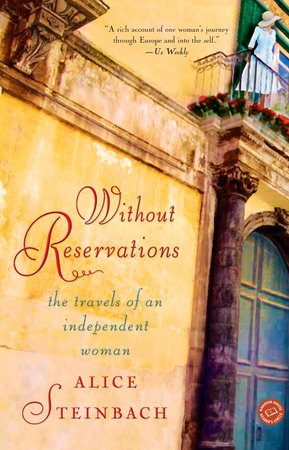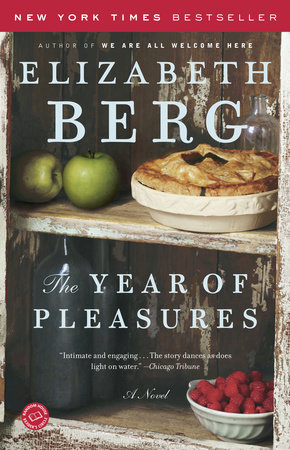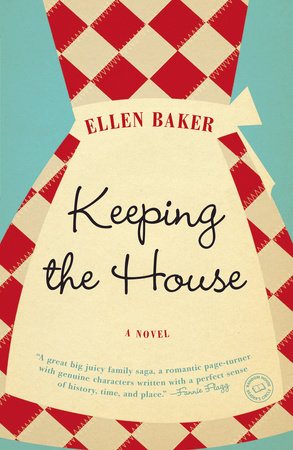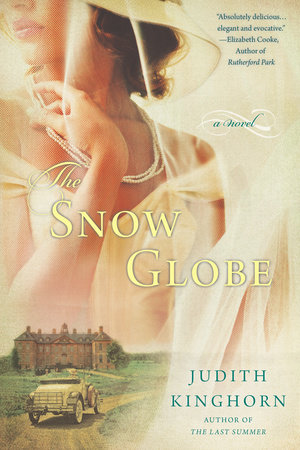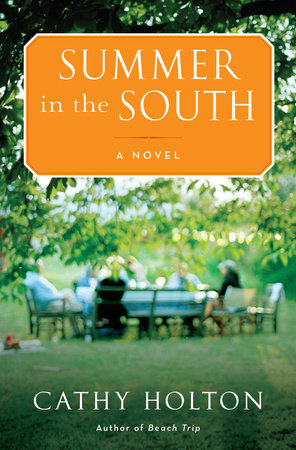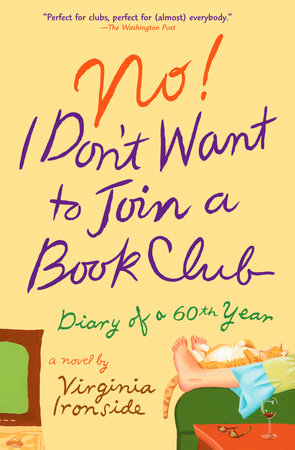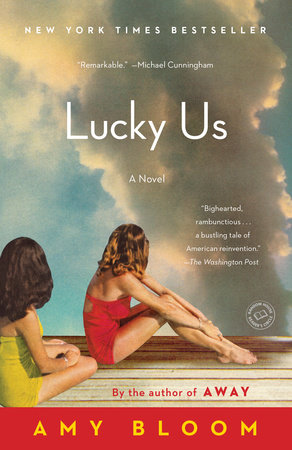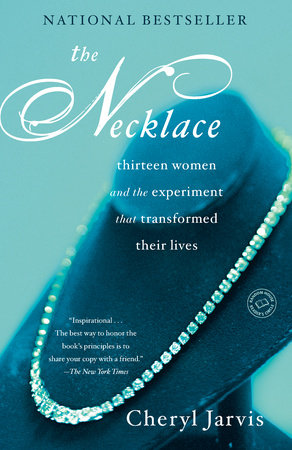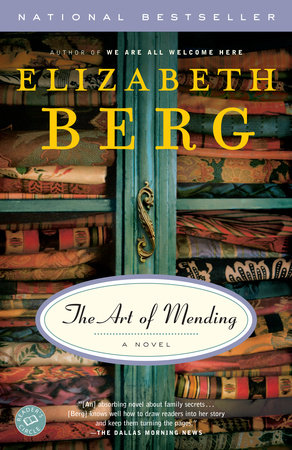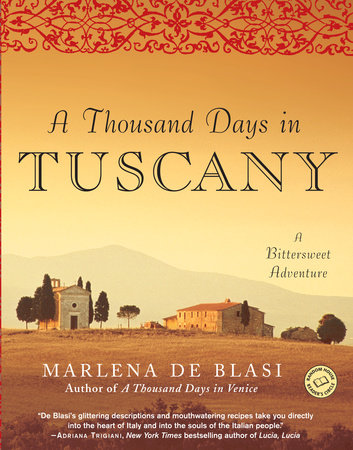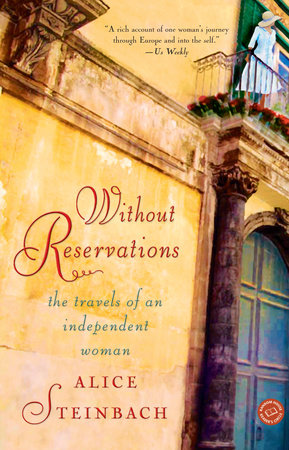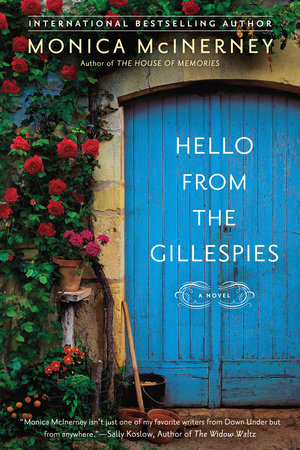Author Q&A
A CONVERSATION WITH ALICE STEINBACH
Q: Would you describe your book as a travel book or a memoir? Or both?
AS: I would describe Without Reservations as a combination of both, a sort of travel memoir, if you will. But I really think of it this way: It’s the true story of a woman who decides to take a break from the routines of her daily life in order to see more clearly who she is when separated from all the labels–mother, journalist, ex-wife, single woman–that have come to define her. And she decides to do it by traveling alone in foreign countries where, operating as an independent woman, she might learn something about who she’s become over the last thirty years. That woman, of course, is me.
Q: What were you hoping to learn from such an undertaking?
AS: I think it was more that I was hoping to relearn certain things that were a part of me when I was younger. I wanted to relearn how to be spontaneous again, to have more fun, to live in the moment and to take chances. It’s easy to lose this sense of yourself as you become more obligated to family, work and the demands of routines and responsibilities.
Q: And were you successful in achieving such goals?
AS: Yes, I was. Travelling–particularly travelling alone–forces you to be spontaneous and take chances. If you don’t, you’ll be lonely and bored. But I think the most valuable lesson I learned during my travels was this: Once all the old baggage and labels were discarded, I was able to respond more honestly to the world around me. It’s a rare person, I think, who knows what really pleases her in life and what does not. But travelling alone–if you’re willing to be open–can teach you what is essential to your true nature. Sometimes, you are surprised to find out what interests you. Who would have guessed, for instance, that I should find the architectural history of the Paris Metro stops so fascinating? It’s become an ongoing interest of mine.
Q: Did you ever get homesick or lonely?
AS: Absolutely. Once, while walking alone on a cold, foggy night along a narrow street in Oxford, England, the sight of a woman’s ginger-colored cat greeting her at the front door–I’m a cat lover and had two of my own at the time–made me dissolve into tears. But I felt many things during my travels: challenged, homesick, exhilarated, lonely, happy, uncertain, self-confident. And I learned it’s quite natural to feel all those things; I just gave myself permission to have a bad day now and then, knowing it would pass. Not a bad lesson to bring home from such a trip!
Q: Do you have any strategies for combating loneliness? How did you handle eating alone in restaurants, for instance?
AS: Eating alone in restaurants, particularly at dinnertime, is one of the universal problems for the solo traveler. Breakfast and lunch are no problem. I usually take breakfast at the hotel where I’m staying–I hate starting the day by searching for a place to eat–and find it relaxing to have a leisurely breakfast at the hotel. It’s also a good time to meet other hotel guests, who are often more relaxed at that time of day. Unless I have plans to meet someone for dinner, I usually make lunch my main meal of the day. This is the time to try the restaurant you’ve heard about but don’t feel comfortable going in the evening and asking for a “table for one.” Lunch at a fine restaurant is cheaper for one thing; the same dinner at the same restaurant would cost twice as much. Often, after such a lunch I don’t really need to eat a large meal at dinnertime. A salad and yoghurt from the market–eaten in my room–is quite enough.
But there are also places where a woman alone can feel comfortable for lunch or dinner. Museums frequently have cafes or full-service restaurants; many are open at night. One of the most important decisions for me when planning a trip is to pick my hotel carefully. I try to find one located in a lively, friendly neighborhood, one that has cafes and food markets, sandwich shops and small family-run restaurants. I’m willing to spend a little more on such a hotel; it can make all the difference in the world to a solo traveler to feel at home in the neighborhood. In Paris, for instance, there are several small hotels on the Left Bank near St. Germain-des-Pres that have become my home-away-from-home.
Q: What’s the best thing about travelling alone?
AS: One of the best things is that it’s easier to meet people. Part of that has to do with the need to reach out more when you’re a solo traveler–otherwise, you’ll be spending most of your time alone. And part of it has to do with the willingness of locals and those not travelling alone to reach out to you. Sometimes they’ll reach out because they’re interested in what you’re doing alone in some small hilltown in Italy, and sometimes it’s out of pity. Also, people traveling as couples or in groups sometimes get bored with one another and like to meet outsiders who bring a breath of fresh air to their travels.
Q: Can you really form friendships on the road? In your chapter "The Sloane Street Club," you manage to meet three Englishwomen who become your “gang” in London. Tell us about that.
AS: Well, it happened at lunch one day. I knew from previous visits to London that a wonderful shop on Sloane Street–the General Trading Company–had a small lunchroom in its basement. I’d eaten there and the food was quite good. But the thing that drew me there was I knew that they often placed singles–who were agreeable–at a table together. It was there that I met an Englishwoman down from Scotland to visit her daughter. We really clicked and through her I met two other women, one from London, the other from Kent. Over the course of my month in London we did many things together and, I believe, formed a bond. Now, I don’t know if this could happen if one were in a city for two days or a week, but on the other hand, anyone who’s traveled–particularly alone–knows that friendships formed on the road can be quite intense. Whether they last beyond the trip is another matter.
Q: Did any of the friendships you write about in Without Reservations continue upon your return?
AS: During the year after my return, I kept in touch with a half-dozen of the women mentioned in the book. Gradually, though, except for one or two of them — Angela in London and Jean in Australia, for example — the friendships dwindled down to relationships consisting of the occasional postcard or Christmas message. Of course, the question most asked of me is: do you still see Naohiro? And the answer is: Happily, I do. We have met several times in Paris — where his work often takes him — as well as London and Venice. And in doing some research in Kyoto for my next book, the two of us spent some time together.
Q: Were there any moments when you wished you weren’t a woman traveling alone?
AS: Yes, a few. But I’m not sure a man traveling alone for a long period of time wouldn’t feel the same way. It’s part of the human condition to want companionship and security in situations that are uncertain. Still, I write in the book about having dinner in Siena, Italy with three other women–a wonderful, lively dinner in my opinion. Afterwards, one of the women looked longingly at the next table where a young man and woman sat, holding hands and whispering intimately, oblivious to anything but each other. "Tell me the truth," she asked me. "Wouldn’t you give anything to be like them. To be in love and part of a couple."The truth was, it had never occurred to me. I was having a wonderful time. But traveling alone–whether a woman or a man–requires an attitude, one that allows you to look at each day with a sense of adventure.
Q: What advice would you give to someone who sets out to travel alone with more than just tourism in mind?
AS: First of all, I would advise anyone who wants to experience something more than just the tourist’s view of a city to stay in one place–or each place visited–for as long as possible. Try to settle in for a while, even if it’s only for a week. There is a saying among mountain climbers that you can learn more from climbing one mountain one hundred times than one hundred mountains one time. It’s equally as true of travel, I think. Given a choice, I’d always opt to go to fewer rather than more destinations. And, as I said, find a hotel or apartment in a neighborhood that feels like a real neighborhood. It’s very comforting to recognize the man at the newsstand or the clerk at the bookstore or the woman at the market. They may not become your friends but they do become familiar faces. Second, I would say you should set out each day with an agenda. You don’t have to follow it but you should have a plan in mind. It’s very easy to just wander around without setting some goals for yourself. Often I only headed in the direction of the museum or market on my list, then found something along the way that changed everything. Spontaneity is important but so is some planning.
Q: What was the most important thing you learned about yourself on the trip described in Without Reservations.
AS: So many things, it’s hard to pin down the most important. Probably, though–in addition to learning to listen more and talk less–I learned that to be a truly independent person, you must first allow yourself to be dependent. If you’re going to travel alone you have to allow other people to help you. This has always been hard for me. I like to think of myself as an "independent" woman, someone who can get the job done without help. But when you don’t speak the language or get sick while traveling, you don’t have your usual fall-safe system to fall back on. You have to trust that other people will want to help you. And they usually do! When I was ill in London, my new friends took care of me in a way that I would never have allowed at home. But I had no choice. It was a very important lesson–and a very belated one–in my development. And, I am happy to say, it has lasted beyond this trip.
Q: Now that you’re home, how have you incorporated the lessons you learned into your daily life?
AS: At first it was very hard to readjust to the rigidity of "normal" life. Not so much with my family — my grown sons both were living away from home, pursuing graduate degrees, one in law, the other in physics. Still, having said that, I do believe that my “sabbatical” did change the way in which my sons and I related. I could be imagining this, but it seemed as though we all respected each other even more than we had before. Our lives had separated a little bit during that year, and it was as though we had each learned how to see one another standing whole, as individuals. The real adjustment upon returning was learning to meet again the responsibilities of a demanding job.
At the time I was writing a twice-a-week column for The Baltimore Sun, along with the occasional long feature article. I found it difficult to be confined, more or less, to sitting at a desk and to meeting deadlines that loomed over and over again. I felt like the Sorcerer’s Apprentice: As soon as I finished one column, another was due. Instead of getting used to the work that had seemed so “normal” before my trip, I grew more and more frustrated. Finally, after four months of serious thought about what to do, I went to the Editor of the paper and proposed a job change. How would he feel about my giving up the column and returning to the road to write feature stories, I asked him. To my great relief, he agreed to my proposition. It was one of the best decisions of my life; in the years that followed I think I did some of my best newspaper work.
What I learned about the world and about myself during the time covered in Without Reservations also enabled me in 2000 to leave The Baltimore Sun in order to write books full-time. My identity for 21 years was tied up in being a newspaper reporter so it was not an easy decision. It has turned out, so far, to be a good one. Although I still do some free-lance journalism, I am currently working on my next book — a non-fiction work that chronicles my travels around the world for approximately two years.
